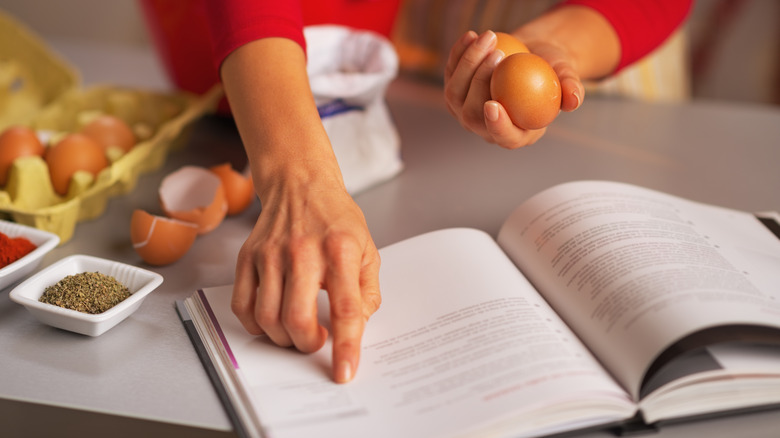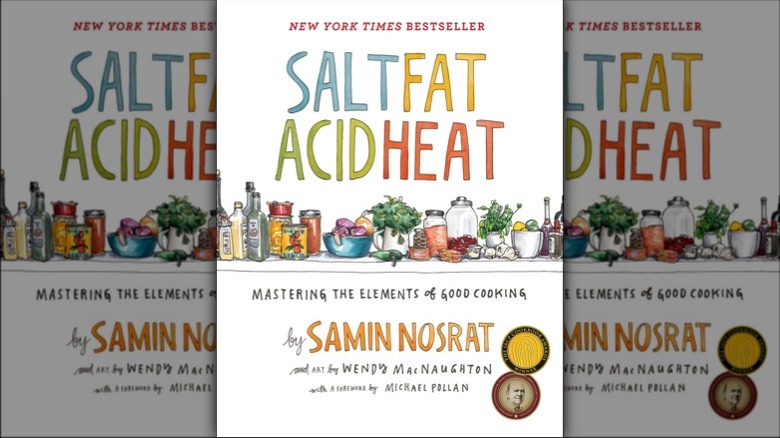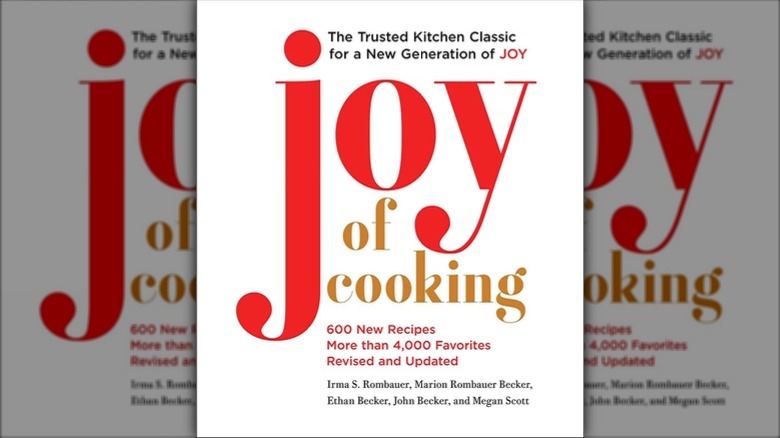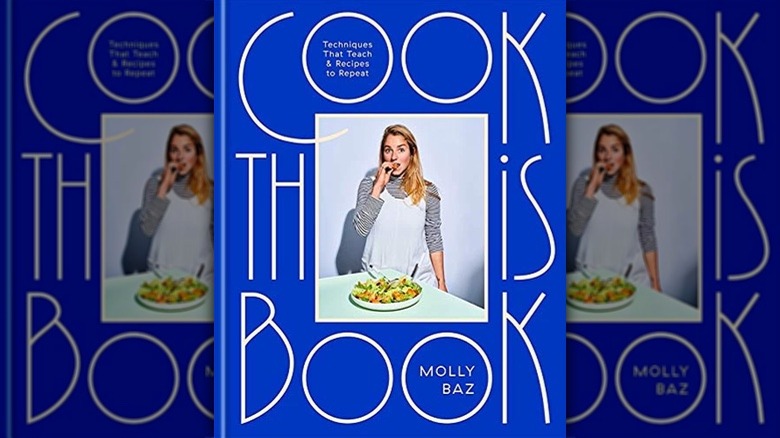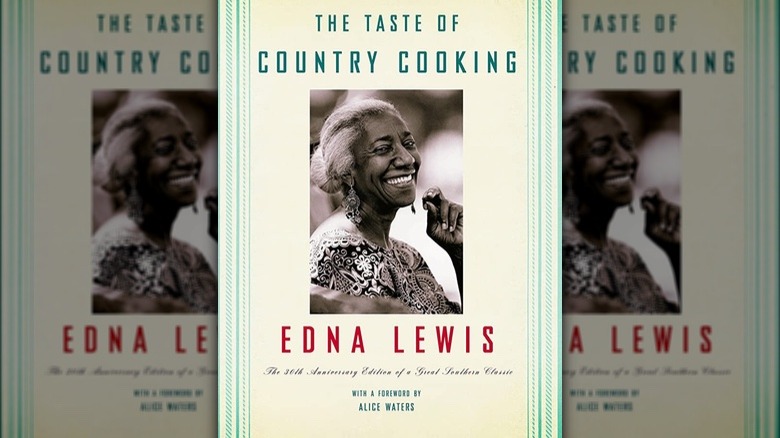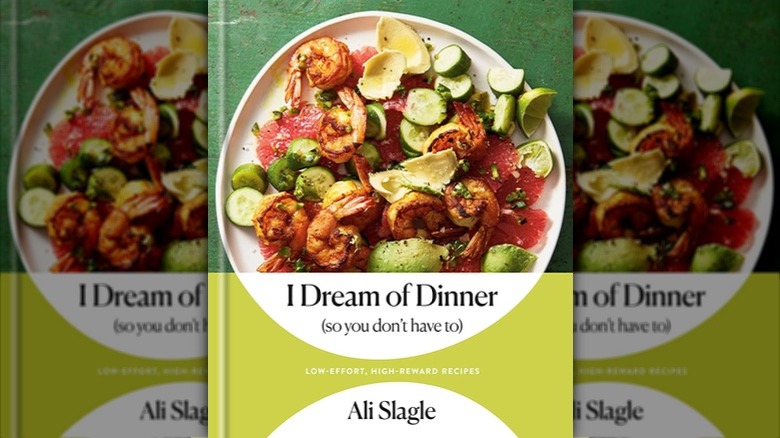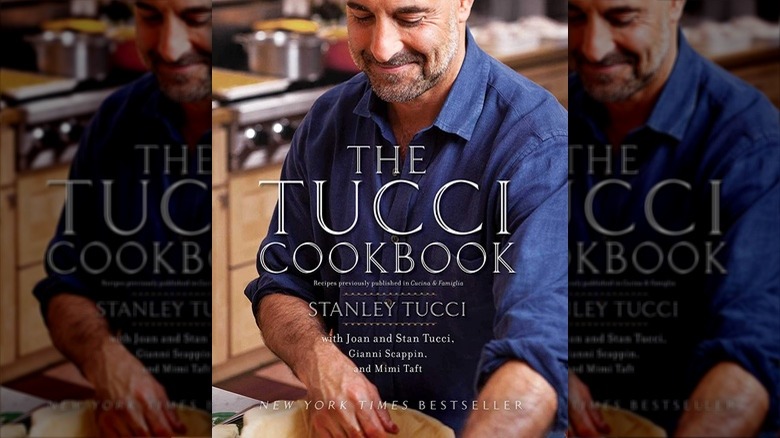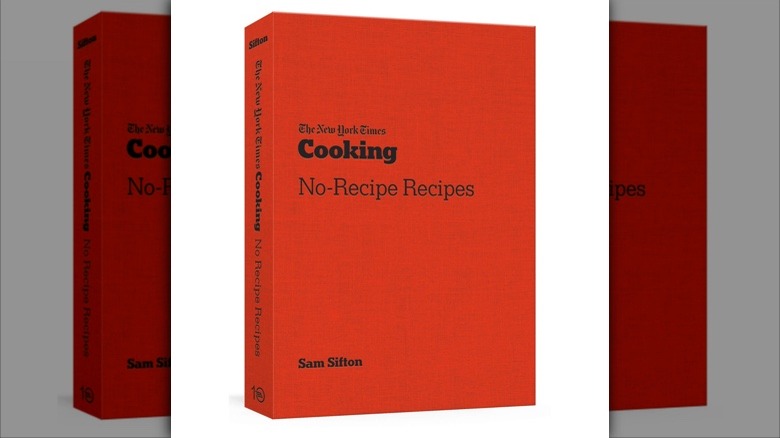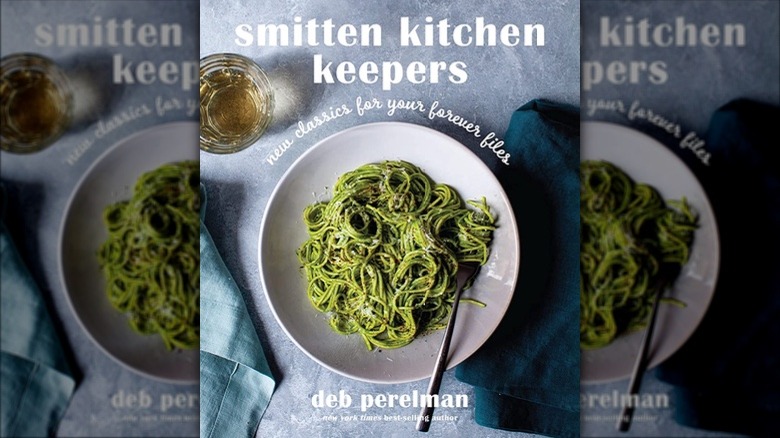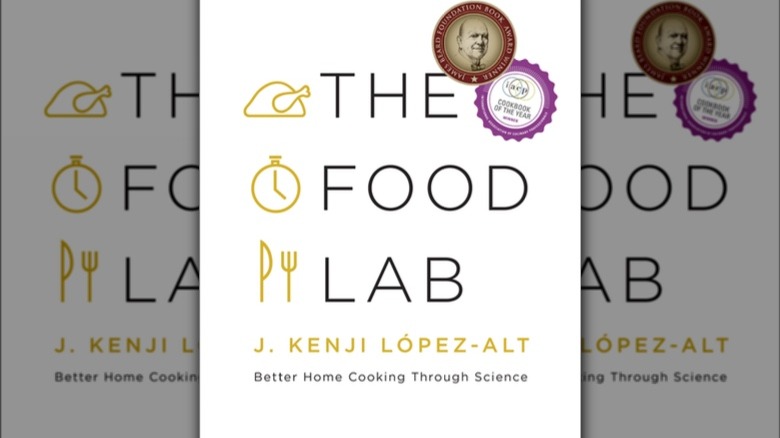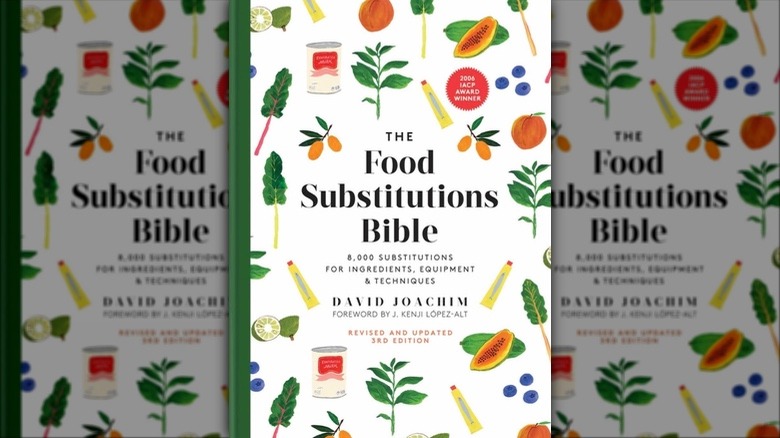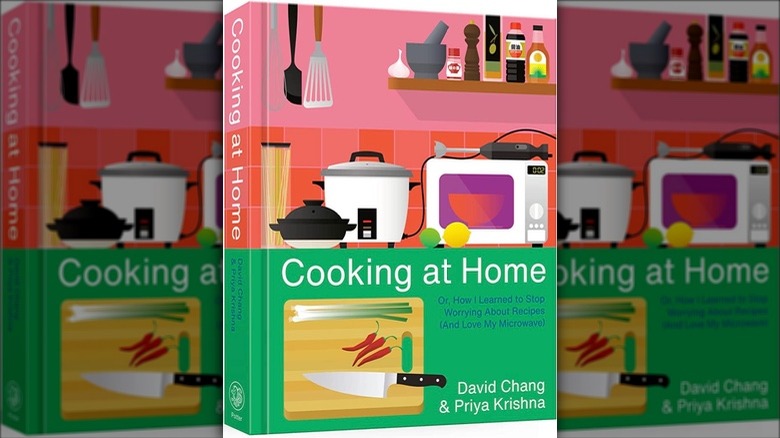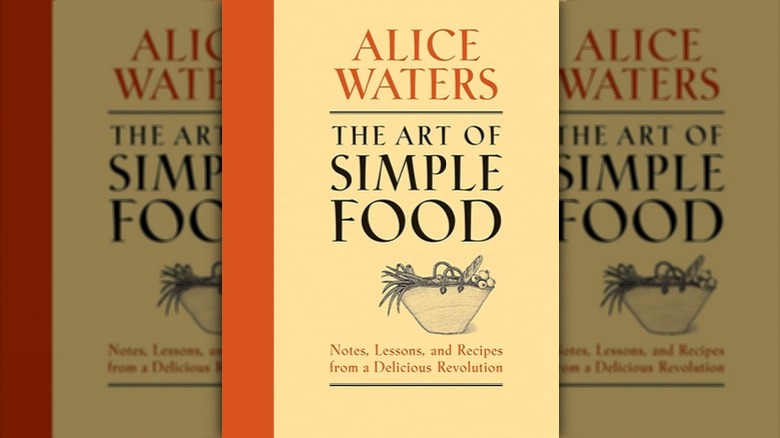12 Best Beginner Cookbooks To Read In 2023
We may receive a commission on purchases made from links.
The internet has no shortage of free recipes. Some of them are truly wonderful, worth bookmarking and repeating time and time again, like these viral food recipes. But for every quality recipe, you can expect dozens more that are packed with conflicting advice, clamoring advertisements, and tacky, cloying writing. That's why, no matter how many recipes there may be on the internet, we'll always swear by the magic of cookbooks — especially if you're new to the world of cooking.
In the home kitchen, the importance of a good cookbook collection cannot be overstated. While we love a knockout recipe as much as anyone, cookbooks do so much more than simply provide step-by-step instructions. A great cookbook inspires you to get in the kitchen, introduces you to new techniques and flavor profiles, and helps you develop a framework for what makes food actually taste good.
If you're new to cooking, check out these 12 cookbooks in 2023. The authors included here represent a range of backgrounds, styles, and generations, with some focusing on specific techniques and recipes and others offering plenty of ideas for how you may riff and develop your own delicious meals. Each book will teach you something new and valuable, from the basics of country comfort food and Italian cuisine to the art of seasoning your food to perfection.
Salt, Fat, Acid, Heat: Mastering the Elements of Good Cooking
This colorful, poetic trove of cooking wisdom is essential reading for new chefs. It's deeply educational, scientific, and brimming with whimsical sketches, charts, and explainers — courtesy of illustrator Wendy MacNaughton — that are gorgeous enough to double as wall art. It's also a joy to read, dappled with jokes and lyrical musings on home cooking that are contagious in their zeal and endless pursuit of flavor.
Written by Iranian-American chef Samin Nosrat, who got her start at Alice Waters' acclaimed Chez Panisse, "Salt, Fat, Acid, Heat" gently guides readers through a framework for cooking that transcends any single cuisine or style. Instead of offering prescriptive, strict instructions, this book distills the art of cooking into four universal elements, which are, you guessed it: salt, fat, acid, and heat. By mastering these elements of cooking and learning how to taste and season your food while you go, Nosrat argues that you'll be equipped with the skills to make any dish infinitely more delicious.
There are stellar recipes, too, which also double as an opportunity to test techniques. For instance, the Caesar salad recipe is great practice in how to layer different forms of salt, as well as a lesson in how to balance that briny flavor with acidic bursts of lemon and fatty oils. If you want a sneak peek of what this cookbook is about, check out the book's four-part docuseries on Netflix.
Joy of Cooking
Want to know the most straightforward technique for cooking, well, basically anything? Check out this nearly 100-year-old encyclopedia of American cuisine, self-published by scrappy, witty Depression-era home cook Irma Rombauer. This has done nothing less than capture the hearts of generations of home cooks. "Joy of Cooking" is a thorough, reliable, and timeless treasure suited to many skill levels, but it is exceptionally helpful for a beginner.
Within the folds of this 1,200-page tome, you won't find rare, expensive ingredients or showboating techniques. What you will uncover are 4,500 tried-and recipes, with warm and practical instructions geared for regular working-class people. That includes everything from blueberry scones and slow-poached eggs to formal entrees like Thanksgiving roast turkey and cheesy herb-stuffed squash blossoms (and really, we're just scratching the surface with these few examples).
What this cookbook lacks in visuals — there are no photographs and few drawings — it more than makes up for in its sheer scope. There are whole sections dedicated to bread, salads, soups, mains, desserts, and even the process of making preserves. And the opening chapters offer sage advice on entertaining, hosting, developing a menu, food safety, and strategies for "streamlined cooking." While the book has seen many updates (and there is considerable debate over which edition reigns supreme) the spirit of the book remains true in all iterations. It is an essential kitchen companion, much like a bowl of sugar or salt.
Cook This Book
The modern, millennial home cooking superstar Molly Baz rose to fame as one of the recipe developers and faces of Bon Appetit's Test Kitchen video series. Her breakout cookbook, "Cook This Book," promises (and delivers) on her core mission: to make cooking fun. One way Baz helps guarantee this lighthearted kitchen energy? Streamlining the details that often cause a novice cook — or even an unfocused veteran chef — to stumble. Not to mention, recipes like the Yogurt-Crusted Lamb Chops with Charred Lemons & Sesame and the Apple Miso Tart are a delight in their own right.
In each recipe, ingredients are organized into a shopping list that has been divided into shorter sections based on where they'd typically be found at a grocery store. The instructions themselves are also divided into clear, distinct sections and address the stages of prep work (that one often forgets to do ahead of time) in the correct order. This essentially guarantees that you'll have your mise en place ready when it's time to start cooking. And for those moments when you have no idea what the cookbook is trying to tell you? You don't have to end up like Moira Rose. Instead, whip out your phone to scan the dozens of QR codes throughout the book, which link to short instructional videos that will guide you through the process at hand.
The Taste of Country Cooking
If you're searching for a reason to cook, there is perhaps no better voice to follow than Edna Lewis. Be warned, though: You may want to abandon your life to start a homestead after picking up "The Taste of Country Cooking." The deeply rural, seasonally-inspired cookbook is built around a year of meals that Lewis shared with friends and family in Freetown, Virginia, a farming community largely made up of formerly enslaved African Americans.
The cookbook is split into specific, evocative meal scenarios, such as the Midsummer Sunday Breakfast and an Emancipation Day Dinner. It focuses, first and foremost, on using the freshest ingredients available, and secondly, on taking advantage of whatever is on hand, whether that involves foraging for wild strawberries or using broken egg shells to help grow seedlings.
But you don't need to live off the land to benefit from Lewis' cooking advice. The techniques and true satisfaction you'll find while learning to craft southern classics like biscuits, sweet potato pie, and Lewis' signature Sour Milk Griddle Cakes and Virginia Fried Chicken are foundational for a new cook who is looking to tackle simple, rewarding meals. More importantly, it helps one fall in love with the process.
I Dream of Dinner
This cookbook is the antidote for your "I don't know what to cook for dinner"-itis. Ali Slagle, the queen of low-effort, high-reward dinner recipes, created this recipe book for the type of person who, doesn't have much patience but still wants great flavor. To that end, she promises in the introduction of "I Dream of Dinner" that no recipe will exceed 45 minutes or 12 ingredients. She makes good on that vow with zippy, often plant-based delights like the French Onion White Bean Bake and Turmeric-Dill Rice & Chickpeas.
In addition to dinner ideas, Slagle offers a glossary of basic cooking techniques that can add flair and flavor to a dish (think: ribboning eggs into soup and a foolproof, fast "anti-marinade" for chicken). She also includes backup strategies and fixes for common issues, like turning your omelet into an emergency scramble should something go awry. With these tips, you can ensure cooking mistakes don't end up making you go hungry.
Another beginner-friendly perk of this book: many of the ingredients include pantry staples, freezer hacks, or other mix-and-matchable elements, meaning that you'll most likely be able to pull off a clever, delicious dinner without having to leave the house to make a last-second grocery store run. And if that doesn't inspire you to get in the kitchen, we don't know what will.
The Tucci Cookbook
If you don't have your own Italian nonna to show you around the kitchen, then this cookbook from Stanley Tucci is the next best thing. Tucci, who became famous for his roles in films like "The Devil Wears Prada" and "Captain America: The First Avenger," is also an accomplished cook who grew up in a "food-obsessed" Italian-American household in upstate New York. Many may well argue that this actor appears even more at ease inside a kitchen than he does before a camera.
"The Tucci Cookbook" is perfect for beginners, as it places careful consideration on how to elevate a simple dish to its most extraordinary form. It warmly invites you inside the Tucci home kitchen and teaches you how to greet guests with timeless, smartly-executed dishes such as antipasti, focaccia, fritters, casseroles, and of course, a bounty of pasta dishes. In addition to nearly 200 recipes, the cookbook also offers wine pairings and lovely anecdotes about food, family, and other bits of magic that occur when you gather folks around the table for a home-cooked meal.
The New York Times Cooking No-Recipe Recipes
Some cooks need a recipe to feel comfortable in the kitchen, while others don't always like to be told what to do. This cookbook from New York Times Cooking founding editor Sam Sifton hangs perfectly in the balance between these two camps, offering a gentle, flexible amount of guidance to get you motivated in the kitchen while refraining from levying any strict rules or requirements. These more than 100 meal suggestions take global and regional inspiration, running the gamut from guidelines for crafting a humble peanut butter smoothie and grilled cheese sandwich to more worldly dinners like curried beans and rice and crab rangoon burgers.
The core principle of the book is that you do not need a recipe to cook a great meal. However, you do need a properly stocked pantry and a bit of imagination. Technique, such as how to properly boil an egg or why you should use stale bread for making French toast, is doled out casually throughout the book. This means that you're bound to sharpen your cooking craft, no matter how stubborn of a chef you may be. Whether recipes have never been quite your style or you're just interested in learning how to cook without them, consider this collection your lackadaisical yet still very helpful guru in the world of improvisational cooking.
Smitten Kitchen Keepers: New Classics for Your Forever Files: A Cookbook
Nothing can be as disheartening to a young cook as a recipe that goes shockingly awry (we're thinking specifically about that one time we bit into a freshly baked biscuit to find small, bitter pellets of baking powder contained within). And while, yes, those sorts of accidents are inevitable and often serve as important teaching moments (always use a sifter), it's nice to get an easy win sometimes. Fortunately, Deb Perelman's list of easy hits is as fail-safe as it is satisfying in "Smitten Kitchen Keepers."
In her third cookbook, the food blogger turned best-selling American cookbook creator has collected 100 recipes that she obsessively tested and retested to be as foolproof and rewarding enough to stick around in your kitchen. A few of the cookbook's greatest hits are the green angel hair pasta dish and a bodega-style egg and cheese sandwich that is simple enough to make even when you're still half-asleep. There is also a well-loved fleet of cakes, tarts, and other sweet treats, including the Strawberry Summer Stack Cake and an impeccably-executed Whole Lemon Poppy Seed Cake, which are not to be missed.
The Food Lab: Home Cooking Through Science
Cooking is full of superstitious and unverified advice. Often, therein lies the magic, but it's also refreshing to understand exactly why and how certain techniques work. For instance, how do you make french fries crispy? And does searing meat actually help to lock in its juices? (If you're curious, the answers to those are respectively a quick blanch and nope.) The unofficial king of this kind of scientific inquiry is J. Kenji López-Alt, who first made waves by publishing an extremely comprehensive investigation into how to make a perfect boiled egg. Since then, he has grown into a global phenomenon, teaching millions how to use science to cook better food.
"The Food Lab" is especially valuable for a beginner, as it teaches you how to understand the underlying principles of what makes a dish good. You'll also learn, how to distinguish between what's vital to a recipe and what's merely set dressing. By learning this science, you'll unlock a whole new world of opportunities in the kitchen — and the freedom to experiment without ruining dinner.
The Food Substitutions Bible
This literary life saver is essentially a food thesaurus. Did you suddenly run out of olive oil? Or are you trying to make biscuits without buttermilk? Don't smear your keyboard or phone screen with kitchen debris in your quest to track down those answers on Google. Instead, this nearly 700-page book, written by veteran food writer and home cook David Joachim, has already done the research on your behalf and even organized the entries from A to Z. With over 8,000 substitutions, "The Food Substitutions Bible" is the perfect resource to keep on hand in the kitchen. That's especially true when you're just starting out and have yet to develop a framework for which ingredients or kitchen tools are similar enough to be interchangeable.
The substitutions suggested here go far beyond condiments and spices. The book includes special charts and tables for just about everything, from deciphering the Scoville Heat Unit of fresh chiles to making flour substitutions to adjusting when your pan isn't the right size or shape. It also offers valuable information on ingredient characteristics, flavor profiles, and cooking techniques, helping beginners understand the fundamentals of cooking and ingredient properties. Whether you're vegan, kosher, or just plain forgetful, this cookbook is an essential item for beginner chefs.
Cooking at Home: Or, How I Learned to Stop Worrying About Recipes (And Love My Microwave)
This collaborative work by food writer Priya Krishna and restaurateur Dave Chang is a relaxed, encouraging ode to home cooking that's another member of the "no recipe" cookbook genre. It's all about working smarter rather than harder, eschewing the belief that scratch-made, precisely-chiseled recipes are inherently tastier or better than dishes that are quick or use shortcuts. As both Chang and Krishna share in the introduction, neither of their parents ever used recipes, though they were brilliant home cooks. But then why do cookbooks always focus so intently on measuring out tablespoons of garlic powder rather than teaching what's actually happening to the food?
In practice, that means you'll encounter chapters that cover how to realistically cook seafood without a local fishmonger connection, as well as ways to work with mediocre produce, methods for making meat, and a decidedly non-intimidating recipe for flatbread. There's also an entire section about how to use your microwave to expedite cooking food like rice, chicken, and potatoes, along with the basics of food safety. Beginners who read this book will come away with a stronger understanding of what makes a dish work. They'll also have the confidence to approach food in a more dynamic and instinctual manner.
The Art of Simple Food
The Berkeley, California-based restaurant Chez Panisse, founded by chef and food activist Alice Waters, is considered downright monumental in the culinary world, and if you've dined there, you know it's got that reputation for a good reason. In her cookbook "The Art of Simple Food," Waters breaks down her approach to the revolutionary ethos of Chez Panisse, which boils down to drawing on fresh local produce and responsibly-sourced meat and seafood. The book also encourages readers to develop a more mindful, sustainable approach to eating, one that appreciates the beauty and simplicity of food in its most natural state.
Since much of what Waters learned about cooking was inspired by time she spent in France, you'll see recipes for classic French dishes like ratatouille and cassoulet. However, for the most part, the recipes here are more inspired by what's available to you on a seasonal basis. She also includes coaching on basic cooking techniques and instructions for how to make essential sauces, soups, and salad dressings. And while you're busy learning all the nuances of simple food, you'll likely find a brand new appreciation for farmers and other makers of food along the way.
